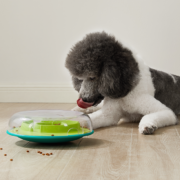If you’re a pet owner, you’ve undoubtedly noticed a number of quirky behaviors in your beloved pets. For dog owners, one of these is licking another dog’s ears. Why do dogs lick each other’s ears?
Ear licking seems to have no good explanation at first glance — it’s hard to imagine why they could be doing this — but your pooch might be responding to ancestral urges or maybe they’d just like a little snack!
There are actually a variety of reasons why dogs lick others’ ears, so let’s take a look at this odd aspect of dog behavior.
Why Does My Dog Lick Other Dogs’ Ears?
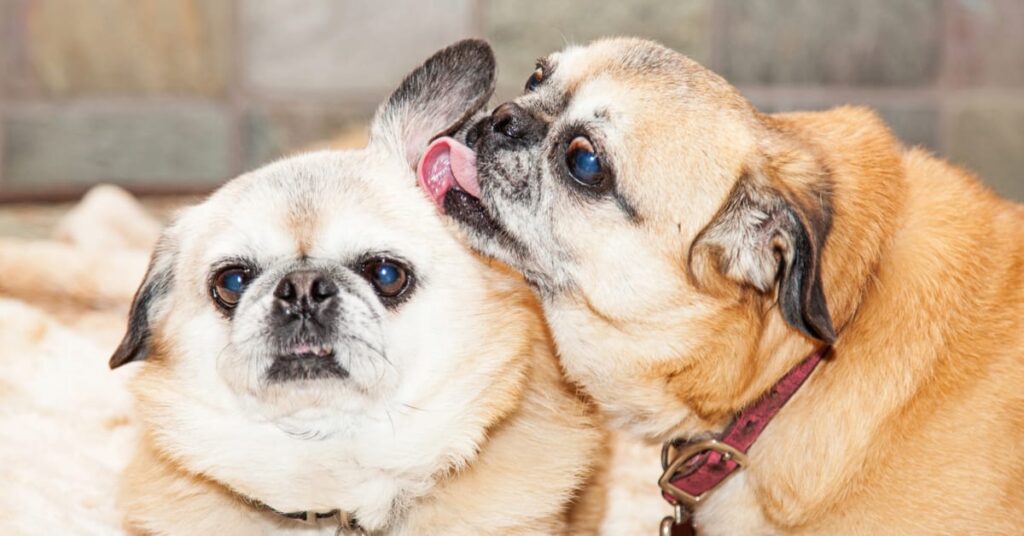
The thing you have to understand about dog breeds is that their ancestors were pack animals. In fact, they see us as other members of their pack.
Like any good pack member, communication is key, and for your pooch, that means barking and licking, among other behaviors. Licking is something that pack members use to say, “Hey, I’m here!” It’s really an essential part of living in a dog pack.
Of course, it’s been a long time since dogs were wild pack members, but genetically, they still are, so licking is still an important way for them to communicate. Your furry friend licks you as a sign of affection, and this is behavior they learned as a puppy.
Mother dogs lick their babies to groom them and show her motherly love. The puppies pick up on this from adult dogs early in life, and they continue the behavior as part of communicating with other pack members. It’s often the submissive dog who is licking the dominant dog’s ears and you can tell which is which by watching their body language.
Submissive dogs often keep their tail down when they approach a dominant dog, and they will do that kind of cheesy submissive grin. They might also lie down and expose their belly to the dominant dog as a way of saying, “I recognize you’re the boss.”
Aside from submission, it’s also a way for your dog to say I love you and I respect you and soothe his anxiety. According to the veterinary experts at PetKeen, there are, however, some other possible common reasons that dogs lick other dogs’ ears. Let’s explore some of these since they can indicate a medical issue in the lick receiver’s ears.
It’s a Grooming Technique
Your friendly pooch may like the other dog and want to show that by grooming them. They lick themselves as part of a grooming regimen, but they can’t reach their own ears, so this is how other dogs can help them out.
When two dogs are on friendly terms as part of the same family, they become very comfortable grooming each other. Licking each other’s ears is just one way to show that. What’s more, it can ward off ear mites, but too much licking can cause irritation and possibly an ear infection.
They Want a Little Snack 🤢 (Yuck, I know, but…)
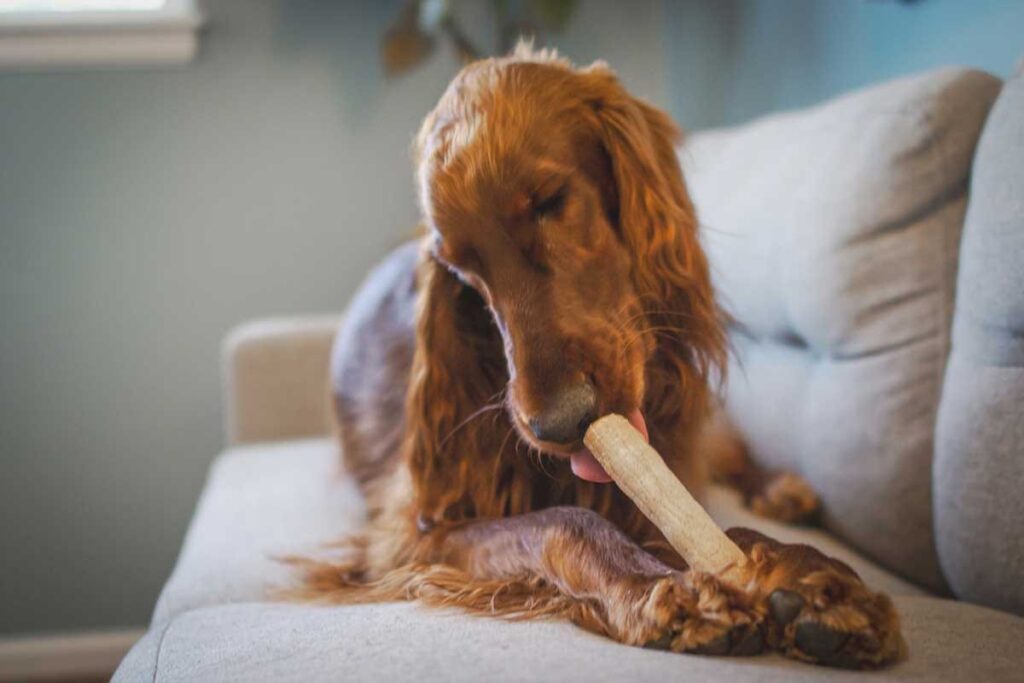
I know, I know, it’s gross, but dog owners know that dogs are sometimes into gross things. There’s nothing like a little taste of ear wax to make your day!
Ear wax is apparently salty, and many dogs love salty stuff. So they will sometimes grab a little ear wax if they’re peckish. Now, everyone loves a little snack every now and again, but like anything, earwax consumption should be done in moderation.
It can drive the other dog crazy if your dog is always licking their ears, but it can also be irritating and can lead to a medical issue. That’s why if you see your dog doing this a lot, you might want to put a stop to it. You might consider giving your pooch an interactive toy to keep him occupied so he won’t lick as much.
It Can Signal an Ear Infection
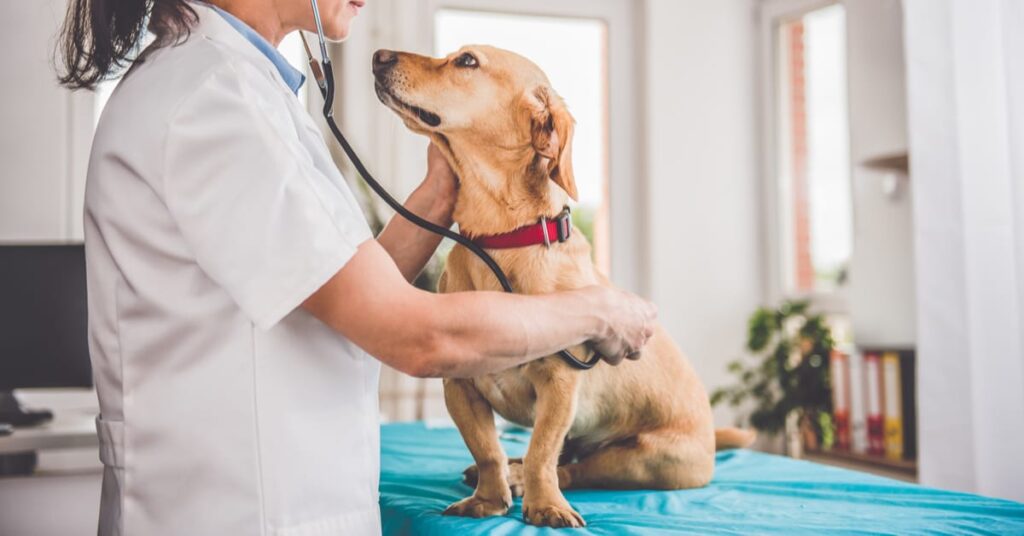
Another reason dogs might lick another dog’s ears is that they may be detecting an ear infection. They may even detect this infection before it becomes bad enough for the dog to show signs and symptoms. That’s just how good your dog’s sense of smell is.
If you see them licking another dog’s ears a lot, you might check to see if the ears appear dirty inside or if there is any kind of discharge coming from the dog’s ears. It sounds gross, but your dog may just love the taste of that discharge (ew).
If you do notice some discharge or redness, it might be time to take your dog to the vet for a checkup. They can treat it before the infection leads to other complications like a hematoma of the ear flap.
This can happen when the dog starts shaking his head excessively because of the pain and irritation of an ear infection. A hematoma is much more complicated to treat than a simple ear infection so it’s best to take care of that before it becomes a bigger problem.
Licking is Soothing
Everyone’s got a little compulsive disorder, don’t they? Well, dogs can also have nervous and compulsive behaviors like licking their paws or another dog’s ears. Excessive licking can signal that your dog is anxious.
If this is the problem, however, you’ll need to do more than simply stop the licking to change the behavior. You’ll need to direct their attention elsewhere. This is where an interactive toy can come in handy. It can give your dog something else to focus on rather than other dogs’ ears.
It’s Better than the Butt?
Like sniffing another dog’s butt, licking another dog’s ears is a way to greet other canine friends. If you’re a dog owner, you’ve definitely seen the butt-sniffing behavior, but some dogs won’t allow that, and so, ear licking is an alternative to the rear end. I can’t help but think it is better for the sniffer too!
Is Ear Licking Safe?
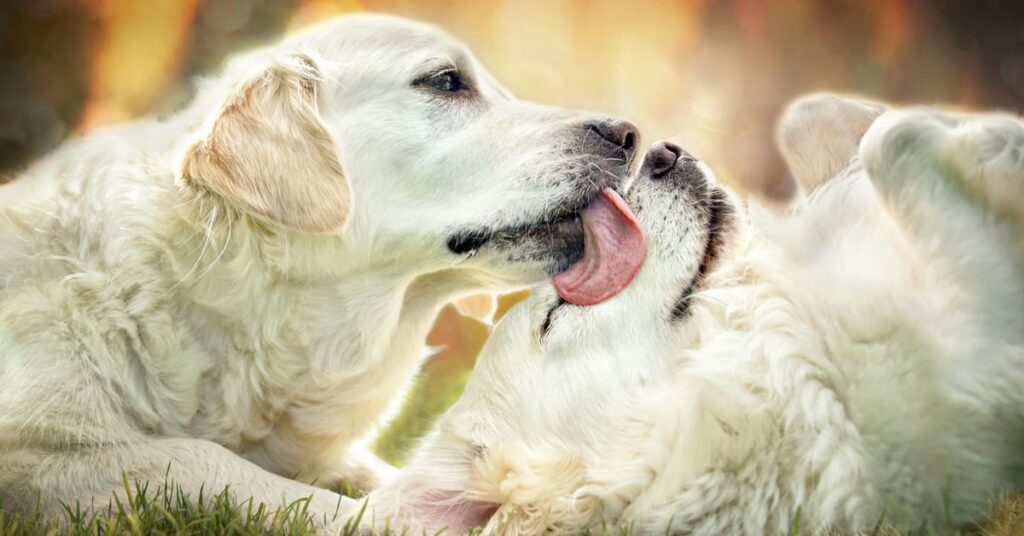
This is a natural question for pet owners to ask, but the answer is not so clear – it’s a maybe. It can be safe and even healthy for the dominant dog who’s getting his ears groomed, but if your dog is an excessive licker…well, too much of a good thing and all.
It can cause irritation which can result in an actual ear infection. Your dog may also be excessively licking the other dog’s ears because he senses the presence of an infection, so in that case, you need to get the dog receiving the licks checked by a vet.
How Can I Stop Excessive Licking Behavior?
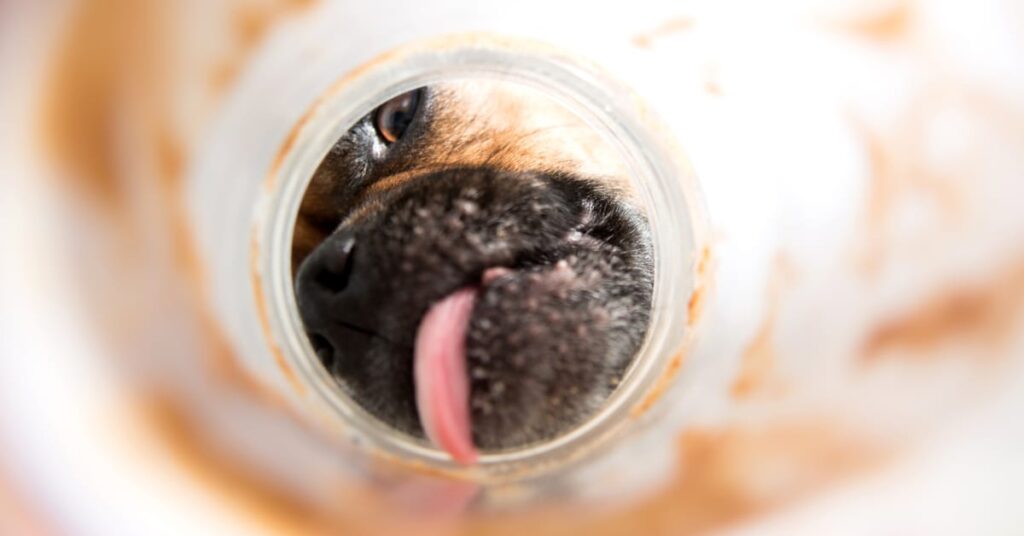
Licking can be your dog’s way of telling you he’s bored or that the other dog might have a medical issue. It can also cause irritation and other problems if your dog is an excessive licker, so how can you stop dogs from licking each other’s ears? Here are a few ways to curb this normal dog behavior.
1. Distract the Licker
As we’ve mentioned, an interactive toy can work wonders to distract your dog from obsessive licking behavior. If you do this, however, you’ll want to give your dog the toy before they start the licking or it will work as positive reinforcement for the behavior.
An interactive toy is better than regular dog toys since your dog can easily become bored with them. Interactive toys often come with a treat that your dog has to work to get. That’s what keeps their interest.
2. Try a Little Dog Training
Dog training is another great way to keep your dog from getting bored and developing a compulsive disorder as a result. It’s also a great way for you to bond with your dog, and to make them feel like they have a job to do.
Dog training is really something every dog owner should do to ensure their dog is well-behaved. A little disclaimer here – it doesn’t solve every problem and it has to be done with love and positive reinforcement to really work, but it can do wonders for many behavioral problems.
3. Give Your Dog Something Better to Lick
If it seems as though your dog’s licking of other dog’s ears is to help him self-soothe, you might consider giving them something else to lick. You can actually get a lick mat that sticks on the wall.
You can put some peanut butter on the mat which prevents your dog from licking it all away quickly. It’s a great way to give them something to do to soothe themselves that doesn’t create problems for other dogs.
Final Thoughts
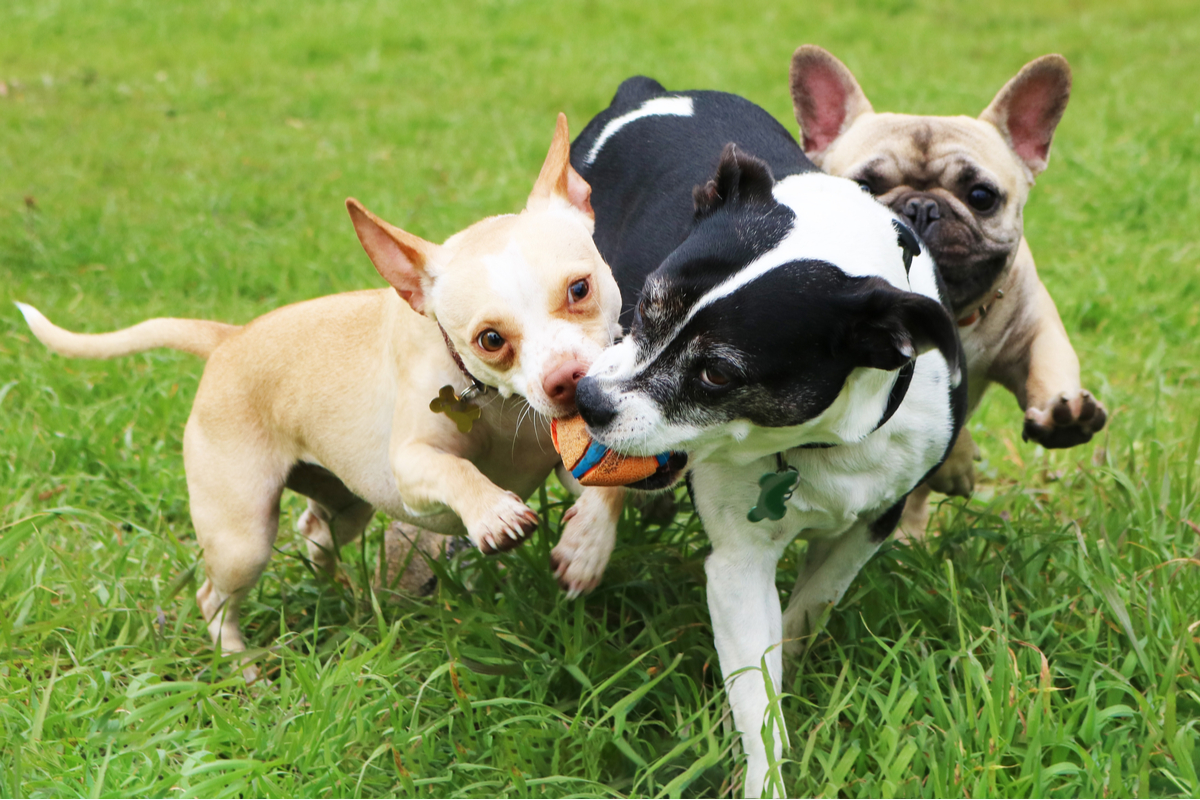
Dog licking is one of many dog behaviors that can sometimes be gross but are often a normal part of being a pack member. If your dog is compulsive about it, however, it can cause problems for the other dog’s ears. It may even cause an ear infection.
It could also be a sign of a medical issue in the other dog, so that’s an important consideration. It might also signal that your dog is bored and needs a little dog training or other interaction to stay happy as well as healthy.

